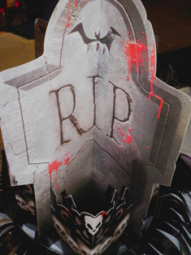Pat Bertram's Blog, page 197
May 22, 2014
Something Fun
Yesterday a fellow author said her muse had deserted her, and she asked for suggestions as to what she could post for her blog. I sent her this list of possible topics:
Something fun — a favorite photo, a special recipe, a secret (and impossible) dream.
Something that makes you smile, that comforts you, that makes you want to dance.
How writing changed your life or how it made no difference at all.
Your muse. Who or what is it normally? Maybe post a photo of your muse. Or write a letter to your muse begging him/her to come back.
The one letter you wish you’d never written, the one letter you didn’t write but wish you had.
Something you should have thrown away a long time ago, but can’t part with.
Your wildest non-erotic fantasy.
She didn’t use any of my suggestions, but ironically, my own muse has deserted my today. Well, not really — I don’t have a muse, but I am sitting here with such a blank mind that a ready list of blog topics is nice to have.
So, something fun . . .
One day when I was out walking in the desert, I saw this television sitting right there on the path as if posed for a photograph, so I took the picture, then I pasted the photo itself onto the television screen because the idea amused me. Hope it amuses you, too.
***
Pat Bertram is the author of the suspense novels Light Bringer, More Deaths Than One, A Spark of Heavenly Fire, and Daughter Am I. Bertram is also the author of Grief: The Great Yearning, “an exquisite book, wrenching to read, and at the same time full of profound truths.” Connect with Pat on Google+. Like Pat on Facebook.
Tagged: blog topics, muse, something fun, television in the desert


May 21, 2014
Maybe I’m Not as Sane as I Think I Am
For the past few months, I’ve been researching mental disorders, trying to find a classification for my dysfunctional homeless brother to see if there would be some indication of how I could get him out of my life. I thought he was bi-polar since he does suffer from depression, manic episodes of anger, and grandiosity, but he exhibits too many strange, sometimes terrifying, and often irrational behaviors to have a simple mood disorder.
A good indication of his problems has been the names he calls me, and the disorders he accuses me of having. So often people — even so-called normal people — project their problems onto others. And I seem to be my brother’s projection screen. He tells me I have a dissociative personality disorder. He tells me I’m a paranoid schizophrenic. He tells me I don’t care about anyone but myself.
 Sounds like a good place to start looking for what ails him. The closest thing I’ve found to describe him is schizoaffective disorder with some OCD mixed in. Or a paranoid schizophrenic with bipolar disorders and OCD. One of the indications that he’s had a break from reality is his spitting. Such a simple thing to create chills — that ptoo-ptoo-ptoo makes me want to run far, far away. I’ve had a hard time tracking down the symptom since it doesn’t seem to be all that common except in certain cases of bipolar disorder and narcissistic rage (and wow, does he have rage!), but recently I’ve found instances where some paranoid schizophrenics spit for the same reason my brother does, to “get rid of the poison.”
Sounds like a good place to start looking for what ails him. The closest thing I’ve found to describe him is schizoaffective disorder with some OCD mixed in. Or a paranoid schizophrenic with bipolar disorders and OCD. One of the indications that he’s had a break from reality is his spitting. Such a simple thing to create chills — that ptoo-ptoo-ptoo makes me want to run far, far away. I’ve had a hard time tracking down the symptom since it doesn’t seem to be all that common except in certain cases of bipolar disorder and narcissistic rage (and wow, does he have rage!), but recently I’ve found instances where some paranoid schizophrenics spit for the same reason my brother does, to “get rid of the poison.”
I’ve learned a lot through my researches, especially how prevalent mental disorders are, which makes me feel so very lucky, but finding some sort of name for what is wrong with my brother helps not at all. He’s still swinging from one mood, one personality, one delusion to another. (Though oddly, he seems to save his invectives and delusions for me. He seems to react normally — normally for him, that is — with other people.)
I’ve been taking my blog readers’ advice into consideration and researching various options, but there aren’t many. Current laws say that the most you can institutionalize someone without his consent is 72 hours. Perhaps they could keep him longer, but once the episode passed, they would probably let him go with a prescription for drugs he would not take. And after all the hassle, I’d be back where I started. I could also call the cops, but here they just warehouse the mentally ill and do nothing to get them help. And again, after all my efforts I’d be back where I started because they’d just let him out since he hasn’t really committed a crime except harassing me. In addition, someone who used to be a chaplain for correctional institutes told me the other inmates tend to beat up those with mental problems, so the jails try to get rid of them as quickly as possible. I can understand that — I have my own times of wanting to beat my brother just to get him to shut up and leave me alone, though I’ve been channeling my frustrations into less violent activities such as researching.
As inhumane as it might be to consign him to the garage (it’s not much different than confining the insane to an attic), it’s the only way I can live with the situation. It gives me comfort knowing he is locked out. He won’t break into the house because even at his most psychotic, he is careful not to do anything to anger our 97-year-old father. (He seems oddly protective of the old man, but that is probably just another of his delusions since he thinks I’m trying to strangle our father and inherit this house. But I don’t inherit the house. In fact, once father is gone, I will be temporarily homeless. Well, without a home base. That’s a better way to phrase it.)
I can see, though, that there could come a day when I do run away. He’s starting to get demanding and threatening. Right now it’s “get me a beer, bitch, or I’ll let all the air out of your tires.” I’m not getting him a beer, of course, instead I’m researching portable air compressors. (Most of the cheap ones plug into the car’s cigarette lighter, and I don’t have one in my car.) I’d get a room for the night to give me some respite, but then there’s my father to consider. If I leave him alone, and something happens to him, I could be arrested for elder abuse. Cripes. The situations I get myself into. Maybe I’m not as sane as I think I am.
***
Pat Bertram is the author of the suspense novels Light Bringer, More Deaths Than One, A Spark of Heavenly Fire, and Daughter Am I. Bertram is also the author of Grief: The Great Yearning, “an exquisite book, wrenching to read, and at the same time full of profound truths.” Connect with Pat on Google+. Like Pat on Facebook.
Tagged: bipolar disorder, mental disorders.schizoaffective disorder, narcissistic rage, paranoid schizophrenic, spitting and mental illness


May 20, 2014
Wake Up and Die Right
At an exercise class today, we talked a bit about the murder mystery I’m going to write about the class (assuming I get myself in gear), and then we did warm up exercises while the teacher sorted through her music to find the recording she wanted to play. When she couldn’t find the right DVD, she muttered, “Wake up and die right,” which stopped me in my tracks.
“What did you say?” I asked, not sure I heard correctly. She repeated the phrase, and I laughed. I’d never heard the saying before, and coming as it did right after a discussion about our fictional murder, it seemed even more amusing. And a bit gruesome.
Wake up and die right. Oh, my.
Odd word s, phrases, and sayings often stay with me, rattling around in my brain until I can make sense of them. (In fact, just yesterday I railed against the appalling sentiment, “He deserved to die.”) The more I thought about “wake up and die right,” the more it made sense. We die right if at the end, we have no regrets. We die right if we’ve lived life to the fullest and used ourselves up, if we’ve danced and laughed, if we’ve enjoyed the company of those who enrich us, if we feel the sunsets and smell the rain-washed air. (If you live in the desert, of course, that rain-washed air comes so infrequently you better smell it when you can because it might be many months before you get another chance.)
s, phrases, and sayings often stay with me, rattling around in my brain until I can make sense of them. (In fact, just yesterday I railed against the appalling sentiment, “He deserved to die.”) The more I thought about “wake up and die right,” the more it made sense. We die right if at the end, we have no regrets. We die right if we’ve lived life to the fullest and used ourselves up, if we’ve danced and laughed, if we’ve enjoyed the company of those who enrich us, if we feel the sunsets and smell the rain-washed air. (If you live in the desert, of course, that rain-washed air comes so infrequently you better smell it when you can because it might be many months before you get another chance.)
Wake up and die right. Oh, yes.
Apparently, the saying came from World War II. Soldiers who let their attention wander were told to “Wake up and die right” — to pay attention, to fight, to get a grip, to die like a soldier if necessary. The adage migrated to the general population and seems to have been prevalent during the late forties and early fifties, but its use faded as memory of the war years became supplanted by other invasions with other jargons — the Beatles, the Viet Nam “police action,” the drug wars.
Today, more than sixty years after the maxim had been laid to rest, it came to life once again. I suppose in a way, it’s reminding to me to just sit down and write the book about the class because, of course, I would regret not having written the story. I just need to wake up and do it so my designated victim can die right.
***
Pat Bertram is the author of the suspense novels Light Bringer, More Deaths Than One, A Spark of Heavenly Fire, and Daughter Am I. Bertram is also the author of Grief: The Great Yearning, “an exquisite book, wrenching to read, and at the same time full of profound truths.” Connect with Pat on Google+. Like Pat on Facebook.
Tagged: dying right, living life to the fullest, odd sayings, wake up and die right, WWII adage


May 19, 2014
He Deserved To Die
I watched a movie the other day, not paying enough attention to be able to tell you the name of the film or any of the plot, but one line caught my attention. “He deserved to die.” We’ve heard that sentiment so often that it’s become all but imperceptible, and yet, for that brief moment, I actually heard the words and now the phrase keeps rattling around in my head.
He deserved to die.
The “he” in question was a bad guy, that I remember. So is death a punishment? Is that why he deserved to die? Since most people seem to believe in some sort of paradisiacal afterlife, it would make more sense to say that he didn’t deserve to die.
 Either way, there should be no “deserving” when someone talks about death. Death comes for all of us — young, old, middle-aged, saintly, wicked, average. We don’t really know what is in people’s hearts and mind, so perhaps everyone is deserving of death. And yet, stillborn infants have not done anything to deserve death — have not done anything at all, in fact — but they are doomed to die before they’re even born.
Either way, there should be no “deserving” when someone talks about death. Death comes for all of us — young, old, middle-aged, saintly, wicked, average. We don’t really know what is in people’s hearts and mind, so perhaps everyone is deserving of death. And yet, stillborn infants have not done anything to deserve death — have not done anything at all, in fact — but they are doomed to die before they’re even born.
If the dead deserved to die, does that mean the rest of us deserve to live? But there is no deserving when it comes to life, either. We’re simply born. What we do with our life is up to us — at least in theory. Often we have no choice as to our circumstances, so we do the best we can.
Deserved to live.
Deserved to die.
After the death of my life mate/soul mate, I used to get lost in the conundrum of death, wondering which of us got the worst end of the deal. If life is a gift, why was it denied him? If he is in a better place, why am I still here?
I still don’t know the answer, but I do know he didn’t do anything to deserve to die, and I did nothing to deserve to live. It’s just the way things are.
Deserved to live.
Deserved to die.
Strange words that don’t mean much of anything.
***
Pat Bertram is the author of the suspense novels Light Bringer, More Deaths Than One, A Spark of Heavenly Fire, and Daughter Am I. Bertram is also the author of Grief: The Great Yearning, “an exquisite book, wrenching to read, and at the same time full of profound truths.” Connect with Pat on Google+. Like Pat on Facebook.
Tagged: conundrum of death, deserved to die, deserved to live, who deserves to die?


May 18, 2014
Grief’s Strange Blessing
We think we know who/what we are, but that image of ourselves is often at odds with what other people think. For example, if I disagree with some people, they call me negative. If I say no when someone asks me to do something, I risk being called contrary. If I want to do things my own way, I’m accused of being manipulative. If I try to set boundaries, I am called a vindictive, vengeful bitch.
Actually, only one person in my life ever dared called me a bitch. If anyone else did, he would not be in my life. It’s not that I want such a person in my life, of course, but my father allows my homeless brother to camp out in the garage, and it is my father’s house. (I don’t want to get into the morality of the situation, or how I am “enabling” my brother by not calling the cops, or how I should leave and let my 97-year-old father fend for himself. I’ve heard it all before, and anyway, that’s not what this post is about.)
When you live with someone with mental problems who insists that it is you who are out of touch with reality, it’s even harder at times to know the truth. Perhaps I am vindictive and vengeful as he says. Perhaps I’m negative, manipulative, and contrary as others say. I don’t think I am, but if I were, would I know?
A friend’s mother is going blind. One day this friend wore a pair of mismatched socks (they were part of a fun set of puposely mismatched socks, not mismatched by accident). The mother looked at the one purple sock and the one pink sock and said, “I love your red s ocks.” No amount of talking could convince the woman the socks were anything but a matched pair of red socks. It’s what she saw, and since she believed her eyes, what she saw must be the truth. And in a way, it was the truth — her truth. She did see red socks even though everyone else saw pink and purple.
ocks.” No amount of talking could convince the woman the socks were anything but a matched pair of red socks. It’s what she saw, and since she believed her eyes, what she saw must be the truth. And in a way, it was the truth — her truth. She did see red socks even though everyone else saw pink and purple.
Besides all the other nastiness my brother spews, he claims I have a dissociative personality disorder. If I did, would I know? I think I would — there should be gaps in memory, strange looks from friends, questions about things I have said — but my brother is the only one who insists I said things I don’t remember saying, who says I did things I don’t remember doing.
There was a time in my younger years where I would have worried about the truth of his allegations because I did feel unbalanced, as if one mental step to either side would send me over a cliff to insanity, but now I know the truth. I am sane. (It’s possible, of course, we are all insane, that life is a form of insanity, but that’s a path I don’t want to explore.)
So, what gives me the confidence to believe I am sane when others allege the opposite? The profound grief I experienced after the death of my life mate/soul mate.
Grief is a totally insane situation, with hormones of all kinds on overdrive, brain chemistry out of whack, emotions out of control, pain so deep it makes it impossible to breathe, tears that flow like open faucets without your volition, dizziness and nausea and a loss of equilibrium that make the world seem totally alien. And yet, somehow, through it all, I could feel the truth of grief, that whatever I experienced was normal. It’s this belief in the normality of grief’s insanity that gave me the courage to write about grief and connect with others going through the same thing. It’s what gave me the ability to explain grief to my fellow bereft, and to assure them that despite what they were feeling, they were not crazy.
And neither was I.
Grief brings strange blessings, and this was my blessing, the thing that is now helping me through a bizarre situation — the utter belief in my sanity.
***
Pat Bertram is the author of the suspense novels Light Bringer, More Deaths Than One, A Spark of Heavenly Fire, and Daughter Am I. Bertram is also the author of Grief: The Great Yearning, “an exquisite book, wrenching to read, and at the same time full of profound truths.” Connect with Pat on Google+. Like Pat on Facebook.
Tagged: belief in my sanity, can we know the truth, dissociative personalilty disorder, grief and insanity, vindictive bitch, what's the truth


May 17, 2014
In a Cavern, in a Canyon, Excavating for . . .
Unlike Clementine’s father, I haven’t been excavating for a mine, but I have been excavating in the caverns and canyons of my workspace.
I turned on the computer a couple of hours ago to write my daily blog. Although I began this blog in 2007, I’ve only been daily blogging for the past 966 days. The miracle is that I’ve found something important to say each of those days (important to me, anyway), but today I’m dragging my feet. I don’t want to talk about what is most on my mind — the insanity of my life. My 97-year-old father is continuing to decline, and my crazy brother is getting increasingly crazy, blaming me for everything wrong in his life. He claims I am the one who’s crazy, tells me I am a jealous, revengeful bitch, but the truth is, I am too tired to be anything but what I am — a person who is doing the best she can under burdensome conditions.
Not wanting to go into the particulars of today’s insanity, I’ve been procrastinating writing this blog, cleaning around my computer and sorting through all the notes that accumulate.
I found a n ote indicating that, as of right now, Jeff — my life mate/soul mate — has been dead for 1513 days. Although I am not actively grieving for him, I still feel a blankness inside that his presence once filled.
ote indicating that, as of right now, Jeff — my life mate/soul mate — has been dead for 1513 days. Although I am not actively grieving for him, I still feel a blankness inside that his presence once filled.
I found an information sheet from my poppy trip that I hadn’t yet read. Apparently, the local Indians believed the Great Spirit sent this Fire Flower to drive away the evils of frost and famine, and to fill the land with warmth and plenty.
I found a phone number, and when I googled the number, discovered it was for a dollar store, though why I have the number, I can’t say. I also found an address for the county jail, and I do know why I have that. I had to go pick up my brother one day after he’d been arrested for public intoxication.
Barely discernible on a paper with many strange hieroglyphics — long forgotten calculations and cryptic notations — I found a great quote: Screw Romeo and Juliet. I want a love like Gomez and Morticia. Oh, my, yes! Now that was a great love affair, albeit unsung. It’s only those who die for love who become fodder for the bards. To be honest, though, I don’t want any love affair. One excavated note reminded me that my subscription to the dating site OurTime expires at the end of the month, and I don’t intend to renew it. I considered asking the one guy who didn’t pose with a motorcycle if he’d like to go to lunch just so I could say the subscription wasn’t a total waste of money, but I only sent him a brief lob to see if he’ll return my serve. (What I know about tennis is almost nothing, so I have no idea why I used a tennis metaphor, especially since I don’t know if I used it correctly.)
The most interesting thing I found in my excavations were notes about Blackwell’s Island. Apparently my family comes by its insanity naturally — we inherited it. Our great-grandfather, who once worked with Edison, and who invented the postmarking machine that continued to be used until the digital age made it obsolete, had been married twice. One wife he threw down the stairs. The other he consigned to the Lunatic Asylum on Blackwell’s Island (renamed Roosevelt Island in 1973). The asylum was supposed to be a state of the art facility, with patients classified as to their illness, rather than all thrown in together, the violent and harmless alike. The Asylum was also supposed to be moral, treating the patients like humans rather than like depraved animals. This humane mental institution never materialized. Instead, the asylum was a dreadful place that journalist Nellie Bly described as a “human rat trap.” Even worse, since convicts from the nearby penitentiary were used as guards and attendants, the patients were “abandoned to the tender mercies of thieves and prostitutes.”
No one knows which of my great-grandfather’s wives is my great-grandmother, but even if she weren’t the one committed (especially since there’s a chance he had her committed for his own reasons rather than her mental state), the insanity could come from good old great-grandfather himself.
The best part about this excavating through the caverns and canyons of my workspace is that now the space is neat and clean. And I did write a blog after all.
***
Pat Bertram is the author of the suspense novels Light Bringer, More Deaths Than One, A Spark of Heavenly Fire, and Daughter Am I. Bertram is also the author of Grief: The Great Yearning, “an exquisite book, wrenching to read, and at the same time full of profound truths.” Connect with Pat on Google+. Like Pat on Facebook.
Tagged: Blackwell's Island, inventor of the postmarking machine, Lunatic Asylum on Blackwell's Island, miscellaneous notes, Roosevelt Island


May 16, 2014
I Am Not an Arthur
Last night I got together with some people for a group walk and the first thing one of the women said to me was, “Are you an arthur?” Although my name is not Arthur, I knew what she was asking. A bit hesitantly, not sure if it were something to be proud of or ashamed about, I admitted I was an author.
The woman said, “I’ve just started writing. You should come over to my house so you can take a look at what I wrote and tell me what you think.”
I didn’t know this woman. Had just met her a few seconds before. And she wanted me to look at her writing? Eek.
As graciously as I could, I said, “I’m sorry, I don’t do that.”
“Why?” she asked.
“Because it’s a good way of making enemies,” I responded.
“Why?” she asked.
“Because people don’t like what I tell them.”
“Why?”
“Because I tell the truth.”
“That’s what I want,” she said. “The truth.”
 By this time, I was feeling besieged. I live with people who constantly want/need things from me. I am always fielding online requests for help from people I don’t know and a few that I do. What I needed last night was a respite from such burdens.
By this time, I was feeling besieged. I live with people who constantly want/need things from me. I am always fielding online requests for help from people I don’t know and a few that I do. What I needed last night was a respite from such burdens.
Still trying to be gracious, though my irritation seeped through, I said. “No you don’t.”
And it’s true, whether she knew it or not: she did not want the truth as I see it. She had no writing experience. She wrote longhand and, because her wrists hurt, she hadn’t written much. She admitted she didn’t know how to spell, and when I told her that computers did that for her, she said she didn’t have a computer, didn’t know how to use one. She didn’t know grammar, either. Didn’t read books on how to write, didn’t read anything, actually, except a very occasional Stephen King.
So yes, I can guarantee she wouldn’t like anything I had to say about a few scribbled pages full of misspellings and grammar errors, and an absence of story elements. What she wanted was 1) for me to tell her that underneath all the obvious errors her writing was great and 2) for me to tell her everything I knew about writing in a few quick sentences. And there was no way I would do either. Besides, even if her writing was execrable, it’s not my place to tell her so and ruin her enjoyment.
I suggested that she read, but her wrinkled brow told me she couldn’t see the similarity between writing and reading. Finally, I told her just to write. To have fun with it. Not to worry about anything else. (Without a computer and with no desire to learn how to use one, she could never be anything but a hobbyist, so she might as well have fun.)
I learned something from last night’s experience, though — the next time anyone asks me if I’m an arthur, I’m going to say no.
***
Pat Bertram is the author of the suspense novels Light Bringer, More Deaths Than One, A Spark of Heavenly Fire, and Daughter Am I. Bertram is also the author of Grief: The Great Yearning, “an exquisite book, wrenching to read, and at the same time full of profound truths.” Connect with Pat on Google+. Like Pat on Facebook.
Tagged: arthur vs author, asking for writing advice, new writer, writing as a hobby


May 15, 2014
Grateful to be Breathing Easily
Today I am especially grateful that I can breathe easily.
Late last night, my father’s oxygen concentrator machine broke down, so I spent most of the night dealing with him and people from the oxygen company. While we waited for a callback, my father became so short of breath, he started going into a panic, so I dragged out the portable emergency canister. He said he’d rather not use the canister, and it’s just as well. Although I’d been told all I have to do is turn it on, no one told me how to turn it on or how to adjust the flow so I didn’t poison my father with too much oxygen.
When the on-call guy from the oxygen company called me, he tried to explain how to set up the portable oxygen canister. I got the oxygen turned on, only to discover the tank was empty, so I had to take the regulator off the empty canister and put it on a full one. Sometimes the littlest things make life difficult, and so it was last night. The regu lator had a ridiculous hard plastic washer to keep the oxygen from leaking, but when I tried to screw on the regulator, the washer kept falling off. If I tilted the canister to lay the regulator over the “snake teeth” as he called the prongs that went into the holes toward the top of the canister, I couldn’t keep the phone propped on my shoulder to hear his instructions.
lator had a ridiculous hard plastic washer to keep the oxygen from leaking, but when I tried to screw on the regulator, the washer kept falling off. If I tilted the canister to lay the regulator over the “snake teeth” as he called the prongs that went into the holes toward the top of the canister, I couldn’t keep the phone propped on my shoulder to hear his instructions.
Finally, the on-call guy said he’d just come out and replace the concentrator machine. Shortly after I hung up the phone, I was able to put the regulator on the canister, but I had no idea how to adjust the flow. Well, now I do. The on-call guy showed me. Also left me a regulator with a washer that snaps into place. By the time he left and my father was sleeping peacefully, it was a bright 7 am. I tried to sleep for a bit, but I couldn’t help thinking that despite the complications of the night, supplemental oxygen is mostly a simple matter. I remembered tales and pictures of iron lungs from my youth, and felt grateful such machines were no longer needed.
Um, wrong. Out of curiosity, I Googled “iron lung” and discovered there are still polio victims living in iron lungs, have been for the past sixty years. I remember when I was young, how terrified I was of those hideous looking machines and even now the thought that some people were sentenced to a lifetime in such a contraption would have given me nightmares if I had been able to fall asleep. Oddly, the people who need to use the tanks because there is still no other way to force their diaphragms to work seemed to have good attitudes. Even that is unimaginable to me. But I suppose the alternative is even worse.
Breathing seems such a simple thing, so simple we mostly do it without even thinking. We draw in air, filter it through our lungs, and exhale the waste. And yet, even that natural act is beyond some people.
I hope you will take a deep breath with me and be grateful you can still perform such a simple, live-affirming action.
***
Pat Bertram is the author of the suspense novels Light Bringer, More Deaths Than One, A Spark of Heavenly Fire, and Daughter Am I. Bertram is also the author of Grief: The Great Yearning, “an exquisite book, wrenching to read, and at the same time full of profound truths.” Connect with Pat on Google+. Like Pat on Facebook.
Tagged: breathing easily, iron lung, oxygen canisters, oxygen concentrator, polio victims


May 14, 2014
Cliché, Classic, Cheat, or Convention?
I’ve been collecting mystery genre clichés to use in a whimsical mystery story. Some of the suggestions people have given me are true clichés — clues, characters, or plot devises that have been so overused they hold no surprise anymore. For example, “the butler did it.” The butler was such a ubiquitous character in older mysteries, and such an unobtrusive character, that the choice of the butler for villain was innovative the first time or two, but it quickly became clichéd. After the butler as villain became prevalent, there came a series of mysteries where the butler was the first suspect, but he was so obvious because eve ryone knew the butler usually did it, that he was quickly dismissed as a suspect, but the wily detective eventually discovered that it was, in truth, the butler. Then there were the mysteries where the butler became the detective. Now, of course, any use of a butler is clichéd, but it doesn’t matter because no one has a butler anyway. I suppose it would work if a character was named Butler. Hmmm. Might be a possibility for my mystery. Could be a fun gag if nothing else.
ryone knew the butler usually did it, that he was quickly dismissed as a suspect, but the wily detective eventually discovered that it was, in truth, the butler. Then there were the mysteries where the butler became the detective. Now, of course, any use of a butler is clichéd, but it doesn’t matter because no one has a butler anyway. I suppose it would work if a character was named Butler. Hmmm. Might be a possibility for my mystery. Could be a fun gag if nothing else.
A convention is the way something is done. For example, in a mystery there must be a mystery, otherwise it wouldn’t be a mystery. There must be someone trying to unravel the mystery, and there must be clues, false trails, and various other common conventions that make up a mystery novel. And especially there must be a satisfying ending to tie up all the story threads. Just because these elements are in all mysteries, it doesn’t make them clichés. A cliché is something that has become so overused that it no longer holds any meaning or surprise, and the whole point of the mystery genre is meaningful and surprising revelations.
The mystery itself, or a specific type of ending could be clichéd, though. For example, the ending where a detective gathers all the suspects together has become a cliché, mostly because everyone today has at least a modicum of an idea of how the police really work, and the cops simply do not gather all the suspects together to unravel their case in public. Even amateur sleuths, such as the clichéd old lady who noses around because she thinks the police are bumbling idiots, don’t do such clichéd gatherings because they should be smart enough to know that’s how people get killed. And anyway, even if she does do a group unveiling, what difference does it make? Any unveiling of the killer or any confession wouldn’t hold up in court. (We did such a gathering for the end of Rubicon Ranch: Riley’s Story, a collaborative novel I wrote with several other authors, but what made it tolerable was my character’s derision of the whole idea.)
The only ending worse than the clichéd gathering is when the villain has the hero cornered, but spends so much time bragging about how he (or she) did it that the hero gets the upper hand. (Or vice versa — the hero has the villain cornered, but spends so much time congratulation himself that the villain gets away.)
Some clichés aren’t really clichés, but are more of a classic story element. For example, a locked room. Locked room mysteries are a subgenre of murder mysteries, and in fact, I will be using a locked room in my story. Locked rooms add a separate element to the mystery, because not only do you have to figure out who killed the victim and why, you also have to figure out how the heck they got into the locked room. And, of course, the locked room has to be an integral part of the story, otherwise it becomes a cheat with no other reason for being than to add cheap suspense. In my case, I can’t do anything but the locked room mystery. The mystery will revolve around a dance studio, and the only time the studio is unlocked is when people are there. It’s hard to commit a murder unseen in a crowd, though it has been done.
Occasionally clichés are cheats. Someone gets a letter from the victim or killer at the beginning of the story, the person puts the note in a pocket or desk drawer unread, but finds it at the end in time to keep the killer from killing again. It’s a cheat because if the fool had read the letter at the beginning, there would be no story.
In a mystery, the main characters have to act to the best of their ability at all times. A woman who is told not to go some place where danger lurks, and she goes simply because she was told not to, is someone who is not acting to the best of her ability. Stupidity is not a plot ploy. It is a cheat.
So, there you have it, a brief primer on the differences between clichés, classics, cheats, and conventions.
**
Pat Bertram is the author of the suspense novels Light Bringer, More Deaths Than One, A Spark of Heavenly Fire, and Daughter Am I. Bertram is also the author of Grief: The Great Yearning, “an exquisite book, wrenching to read, and at the same time full of profound truths.” Connect with Pat on Google+. Like Pat on Facebook.
Tagged: genre writing, mystery cheat, mystery classic, mystery cliche, mystery convention, the butler did it


May 13, 2014
Let’s Play the Cliché Game!
My exercise class suggested I write a book about them. One woman even volunteered to be the victim, though I can’t imagine why anyone would want to kill her. She is lovely, charming, and utterly delightful. I wasn’t going to write the story since it seemed a good way to lose a lot of friends, but at the lunch the other day, I almost whacked one of my classmates with my exercise bag, and she deadpanned, “I’m not the one who volunteered to be the murder victim.” So I decided to write the book. I mean, how could I not use such a perfect line?
I’d like to do the book campy with exaggerated uses and sly mentions of mystery clichés. For instance, I could get a call from one of the women who says she has information, but won’t give it to me over the phone. I immediately rush over there, of course, since such a call is a precursor to being murdered in cheap mysteries, but when I get there I find . . . I don’t know. Something innocuous. That the cell phone battery went dead. (Or better yet, I call the cops, and they think I’m hysterical.) Then there’s the “Don’t Go There” ploy, advice  that a character ignores. When she does Go There, she almost gets herself killed. (Someone suggested this should be a buxom blonde, and of course, I know the perfect person for the role — a lady in red who is a buxom blonde or rather a buxom sometimes-blonde, and she definitely would Go There.) Of course I would also mention the old fictional women from small towns who stumble on so many murders, there couldn’t possibly be anyone left alive in the vicinity. Perhaps even use the alcoholic, donut-eating cop, misogynous cop.
that a character ignores. When she does Go There, she almost gets herself killed. (Someone suggested this should be a buxom blonde, and of course, I know the perfect person for the role — a lady in red who is a buxom blonde or rather a buxom sometimes-blonde, and she definitely would Go There.) Of course I would also mention the old fictional women from small towns who stumble on so many murders, there couldn’t possibly be anyone left alive in the vicinity. Perhaps even use the alcoholic, donut-eating cop, misogynous cop.
I’m going to start out writing the book the way the idea unfolded in real life, beginning with the suggestion of my writing the book, our planning the murder, etc. leading up to the day we go to class and find her dead for real. The victim is such a good sport, she let me take a photo of her being dead to use for the book cover. (She sank to the ground gracefully, and fell into the perfect pose. Hmm. Maybe she is an eminently suitable victim after all. In the mystery world, she would be too good to be true.)
For now, I’m collecting clichés to use in the book. What do you think are the top clichés in mystery/suspense/thriller fiction? Who are the stock characters? What clichés and other mystery genre conventions do you absolutely hate?
But be careful! You might just end up in the book.
***
Pat Bertram is the author of the suspense novels Light Bringer, More Deaths Than One, A Spark of Heavenly Fire, and Daughter Am I. Bertram is also the author of Grief: The Great Yearning, “an exquisite book, wrenching to read, and at the same time full of profound truths.” Connect with Pat on Google+. Like Pat on Facebook.
Tagged: don't go there, donut-eating cop, lady in red, mystery cliches, suitable victim, too good to be true, writing a mystery






